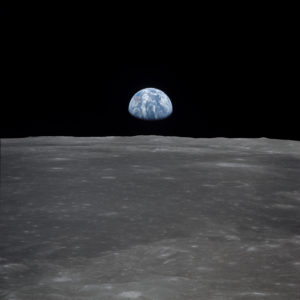
Nikolas Macioci
Time on the Moon
It’s a measure of skill to walk on rocks.
You ask where is everyone else? They’re shining
down on you from behind Earth’s picket fence.
They’re looking at your light through their dining
room window. You can go naked now, if you want.
No one will see you in Times Square or Seattle.
Do you concede that a view of the Earth
from here is breathtaking?
Build a house with a floor and a roof. Bathe
the windows in stars. Mail postcards regularly
to those who think the moon is only a story.
These are the best times you will ever have.
Your head should swell with privilege. If you cry
for home, remember, you turned away from it
once, glad to be in a different place.
You’re standing on the moon that used to shine
into your bedroom on God only knows how
many lonely nights. You never did pull
the drapes shut. That’s the craziest thing to do,
letting it infiltrate your heart with a hunger
for romance. You survived in your room
glutted with light, and now here you are walking
on the source.
You will not cry anymore. That is
an advantage to this place. Tears do not fall.
They become remembrances. Unlike on Earth,
you will dwell under a soundless sky with nobody
to rob you of your sadness.
_______________
Nikolas Macioci earned a PhD from The Ohio State University, and for thirty years taught for the Columbus City Schools. In addition to English, he taught Drama and developed a Writers Seminar for select students. OCTELA, the Ohio Council of Teachers of English, named him the best secondary English teacher in the state of Ohio. He is the author of seventeen books. Critics and judges called Cafes of Childhood a “beautifully harrowing account of child abuse,” but not “sentimental” or “self-pitying,” an “amazing book,” and “a single unified whole.” Cafes of Childhoodwas submitted for the Pulitzer Prize in 1992. In 2021, he was nominated for a Pushcart Prize and a Best of the Net award. In 2022, he was nominated for a Pushcart Prize. He was nominated for a Best of the Net award for 2023. Hundreds of his poems have been published here and abroad in magazines and journals, including Chiron, Concho River Review, The Bombay Review, The Raven’s Perch, and West Trade Review.
Backstory: It was a sweltering July night, and I had just purchased a Canon camera with a high-powered telephoto lens. I’ve always been fascinated by the moon, and I was curious to see if my new equipment would capture a good picture of the moon. I set up my camera and focused. The telephoto was so long that even my breath made it difficult to focus. I snapped the picture that photographed the moon perfectly. Staring at the printed photo, I begin to wonder what it would be like to live on the moon and view the Earth the way I had so often viewed the moon. Hence, I grabbed my pen and wrote. The result was “Time on the Moon. The last line of the poem was inspired by an interview I had read with Jimmy Santiago Baca. He said that sadness is valuable. I liked the originality of his thinking, so I incorporated his idea into the final line of my poem.
Image Credit: Earth as seen from the Moon [NASA] evokes a sense of loneliness

